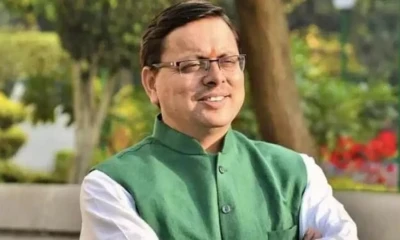Edited by Deepali Verma
Sparing tribal communities from the domain of the proposed legislation, prioritising women’s equality, banning practices such as polygamy, and arriving at a uniform marriage age for all Bharatiya citizens are some of the key recommendations of the five-member expert committee that submitted a draft of the Common Civil Code to Uttarakhand Chief Minister Pushkar Singh Dhami on February 3.
The Uttarakhand Assembly session is scheduled to begin on February 5, and the Common Civil Code Bill is expected to be tabled on February 6.
Among the key aspects of the report submitted by the expert panel, sources said, was making practices under the personal law of any religion a punishable offence. The committee’s report has further recommended the exemption of tribal communities that constitute 2.9 per cent of Uttarakhand’s population, and notable groups are the Jaunsari, Bhotiyas, Tharus, Rajis and Buksas.
To ensure adoption rights that stand the same for all, suggestions have been given to uniformly exercise the existing laws under the Juvenile Justice (Care and Protection of Children) Act. Mandatory registration for the live-in relationships was also recommended.
Sources revealed that the committee came with “overwhelming suggestions” – from the stakeholders during the consultation process – that there should be evenness in the number of children for a couple among other measures for population control. However, the committee informed the Centre that it would form an expert committee to look into the matter. The announcement of such a committee that will propose legislative and policy measures to deal with the challenge of the rising population is yet to be made.
Finance Minister Nirmala Sitharaman during the Interim Budget speech said: “The Government will constitute a high-powered committee to engage in extensive consideration of the challenges arising from fast population growth along with demographic changes. The committee will be mandated to give necessary suggestions for addressing these challenges comprehensively in relation to the goal of Viksit Bharat,” she said.
During the Independence Day address in 2019, Prime Minister Narendra Modi had placed significant stress on the “population explosion” on the national frontburner, calling it a challenge while encouraging the Centre and States to devise schemes to tackle it.
The contents of the draft report are divided into four volumes. The first is the committee’s report, the second is the draft code in English, the third is a public consultation report of the committee, while the fourth volume is the draft code in Hindi.
Further, Dhami said the government would reach out to the Opposition parties to hold a “constructive debate” on the issue in the Assembly next week.
Sources are optimistic that the Bill, once passed by the Uttarakhand Assembly, would be a “model” for other States to adopt. The Bill is expected to immediately go to Gujarat and Assam Assemblies for them to adopt their own Bills.
Sources housing in the Assam government said the State would adopt “more or less the same Bill”.
Dhami claims that the implementation of the Common Civil Code in Uttarakhand has zero intentions to target anyone or to oppose anyone, but to fulfil the poll promise before the Assembly election in 2022.
After the committee’s formation, there has been a reception of over 2.3 lakh suggestions from the public, a majority of which were received through letters, registered posts, emails, and written suggestions through its online portal. By September of 2023, the committee had additionally held 38 public meetings across the State and received suggestions through public interactions.
In conclusion, over 72 meetings had been called to interact with around 10,000 people and study the suggestions received.

















